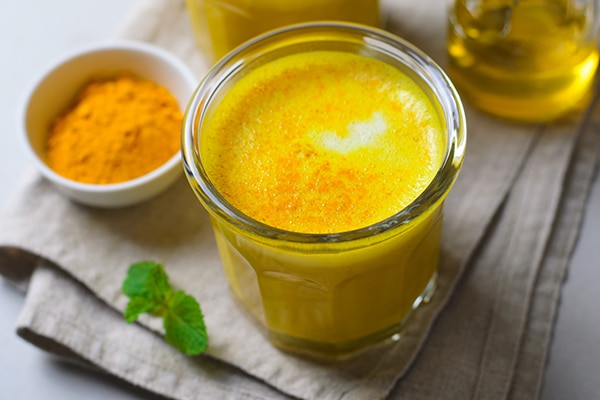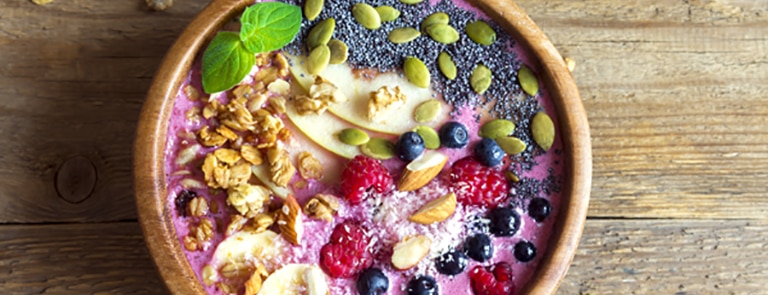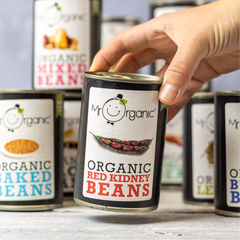B&C
|Carousel main title
Main title
Turmeric milk benefits and recipes
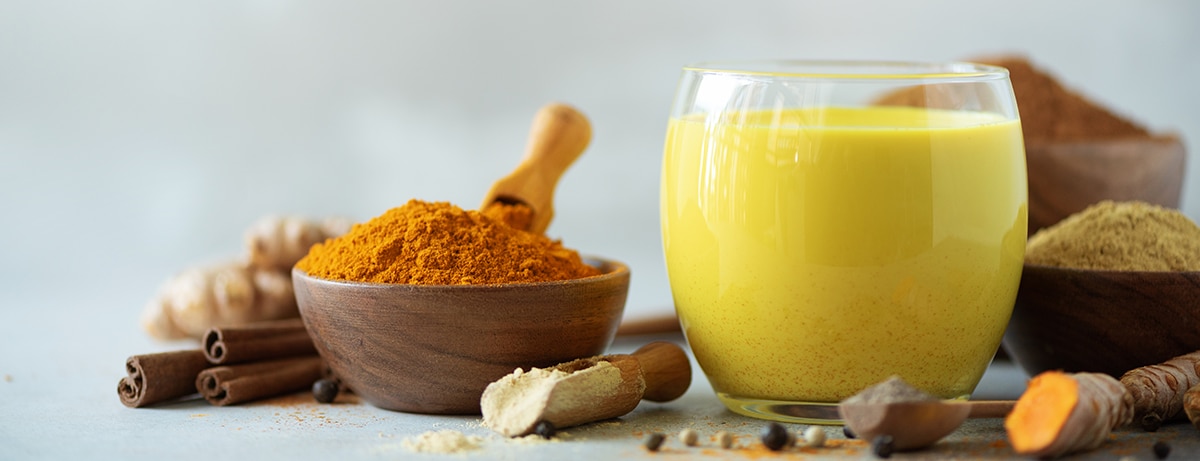
What does turmeric golden milk taste like?
Turmeric and milk come together like a hug in a mug to create a super-comforting drink. This simple base is only enhanced by other spices like cinnamon and maybe a dash of maple syrup and a few grinds of black pepper.
You can even make it taste more like your favourite barista has whipped it up for you by steaming/foaming warm milk and treating yourself to a lush golden milk latte – chocolate sprinkles on top, anyone?
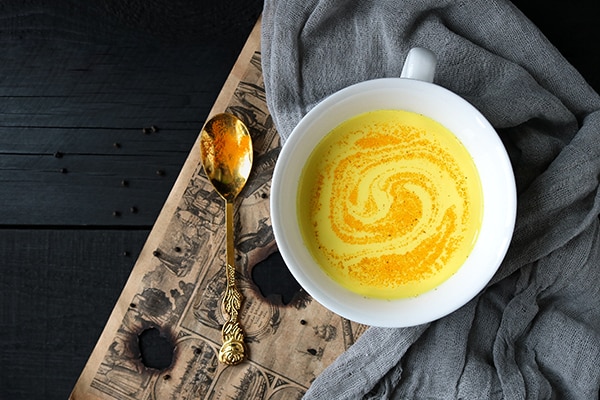

Turmeric is the golden star of the show when it comes to golden milk. This bright spice contains a compound called curcumin, which is considered its most important active ingredient, especially when it comes to it’s digestive-supporting benefits.
Studies have shown that curcumin can help to support normal gut health by relieving bloating, abdominal pain and excess gas.1
This may be due to the role curcumin is thought to play for the gallbladder. In 2013, the University of Nottingham conducted a trial and found that curcumin stimulates the gallbladder to produce bile, which our bodies need to break down fat in the foods we eat.2
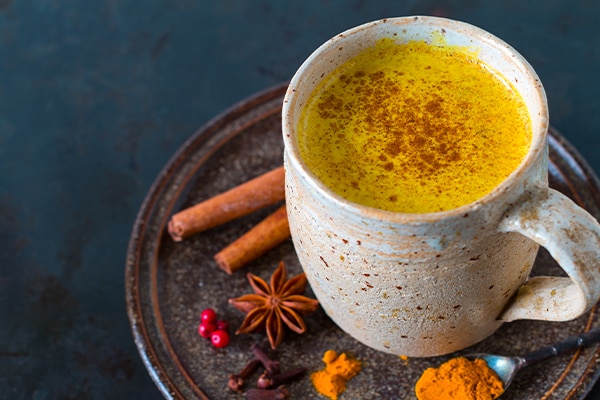

Not only can curcumin neutralise free radicals with their suitable chemical structure, they can also stimulate your own body’s antioxidant enzymes.6,7
Cinnamon is also packed full of antioxidants, like cinnamaldehyde and quercetin.8
Summary
- Turmeric and cinnamon are full of antioxidants
- Antioxidants can help reduce oxidative damage
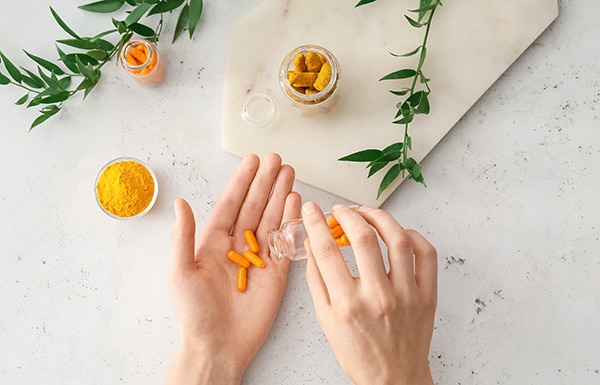

Cinnamon’s anti-inflammatory properties were put to the test in a 2015 study and it was found that a property in it called cinnamaldehyde may help to block the release of inflammatory chemicals into the nervous system, helping to soothe chronic inflammation.10
Ceylon cinnamon was also named one of the most powerful anti-inflammatory foods of 115 tested in a 2015 study featuring in Food & Function.11
Summary
- Turmeric milk could help reduce inflammation
- Turmeric and cinnamon are natural anti-inflammatories
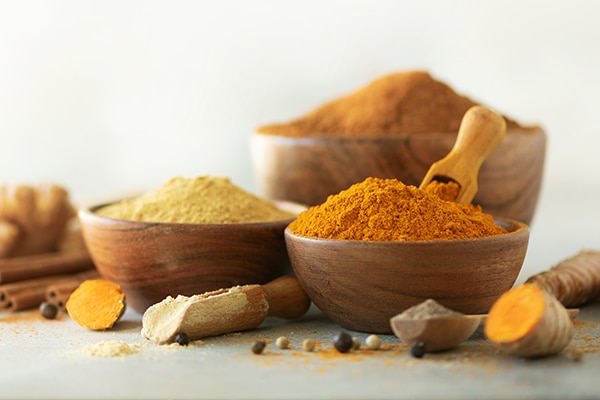

Curcumin has been seen to help people who have depression. One study on 60 depressed people who were given either a traditional anti-depressant, curcumin or both. After 6 weeks, the group taking curcumin were experiencing improvements similar to the anti-depressant, and the group taking both found even more success.15
Summary
- Golden milk could support your brain function
- Curcumin has been seen to help ease depression symptoms
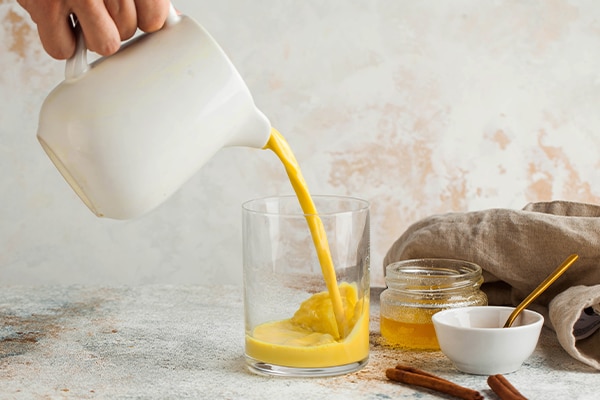

Turmeric milk is traditionally made with cow’s milk as it originates in India, where they consume a lot of dairy. So as far as milks go, it’s definitely a contender for your perfect turmeric milk.
If you’re looking for a creamy plant milk that tastes very similar to the real deal, you should give oat milk a go. It’s full of B vitamins, dietary fibre, beta glucans (which help to lower cholesterol) and no saturated fat.
Soy milk is a classic alternative to cow’s milk, with just as much complete protein, as well as fibre, B vitamins and magnesium.16
If you’re looking specifically for a turmeric recipe for sleep then soy could help in this aspect too. Soy milk is full of isoflavones, and one Japanese population study found that higher daily isoflavone intake was positively associated with optimal sleep duration.17 And that’s coming from a country that already has a much higher average consumption of soy-based products than western countries.
If you want a lower calorie option for your golden milk, then try using almond milk as one 240ml cup contains just 30-50 calories.18
Almonds are also full of antioxidants like vitamin E that can help to reduce inflammation in the body caused by free radicals, so using it in a turmeric milk recipe for inflammation may be beneficial.
Pea milk is full of fibre, packed with protein, low in saturated fat and actually contains more calcium than cow’s milk.19 It’s also rich in potassium, iron, vitamin D and vitamin A.
You can also use:
- Coconut milk
- Cashew milk
- Hemp milk
Cinnamon
Cinnamon adds unique sweetness to golden milk, and only adds to its soothing, warming feeling as you drink it. Not only does it enhance the flavour, it also adds the following benefits to your drink:20
- Lots of antioxidants
- Potentially anti-inflammatory properties
- Potentially antibacterial
- Could support heart health
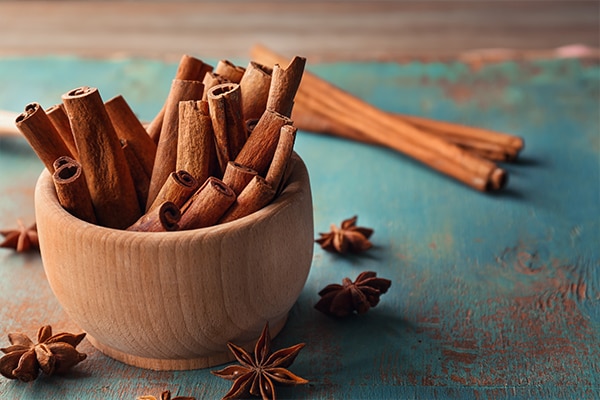

Honey
Honey is packed with natural antibiotic properties and is a healthier way to sweeten anything – including turmeric milk. A warm drink containing honey can soothe the throat and works excellently combined with all the other soothing ingredients in golden milk.
Vegan? Try Agave Nectar instead.
- You can use cow’s milk or plant milk
- Add different spices, like turmeric, black pepper, cinnamon and ginger
- Honey is a good sweetener
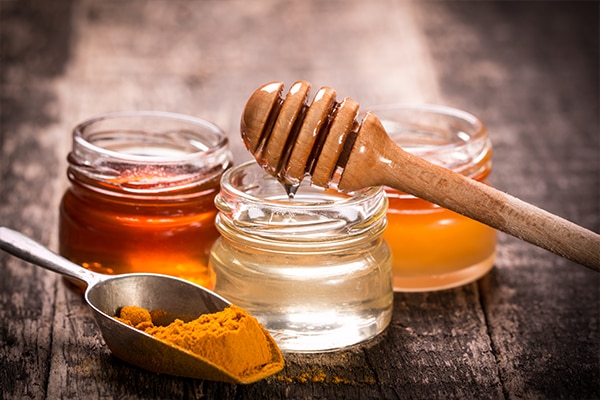

Is drinking milk with turmeric good for skin?
Yep! As turmeric milk acts as a potent natural anti-inflammatory and antioxidant, it only makes sense that it can pass on some of this goodness on to your skin.
However, a growing trend is to apply turmeric-enriched skin care products (usually homemade) directly on to the skin to increase the benefits. Like this easy turmeric facemask, which could help to soothe and calm your complexion, while providing some anti-bacterial benefits at the same time.
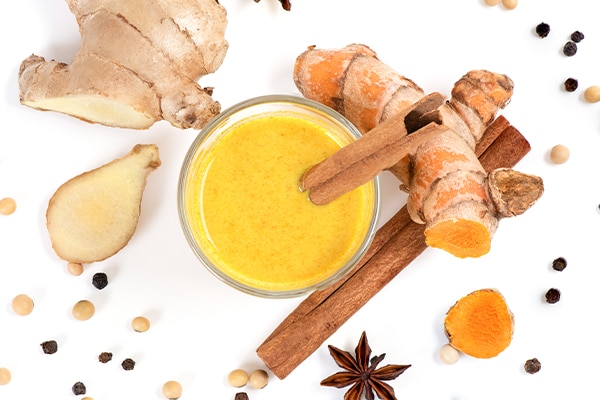

Are there any turmeric milk side effects?
Turmeric side effects are quite rare, and can include the following if large amounts are consumed:
- Yellow stools
- Upset stomach, including diarrhoea
- Rash
- Headache
If you experience these symptoms then please seek the advice of your GP, but it is very unlikely that you will consume too much turmeric by drinking golden milk.
